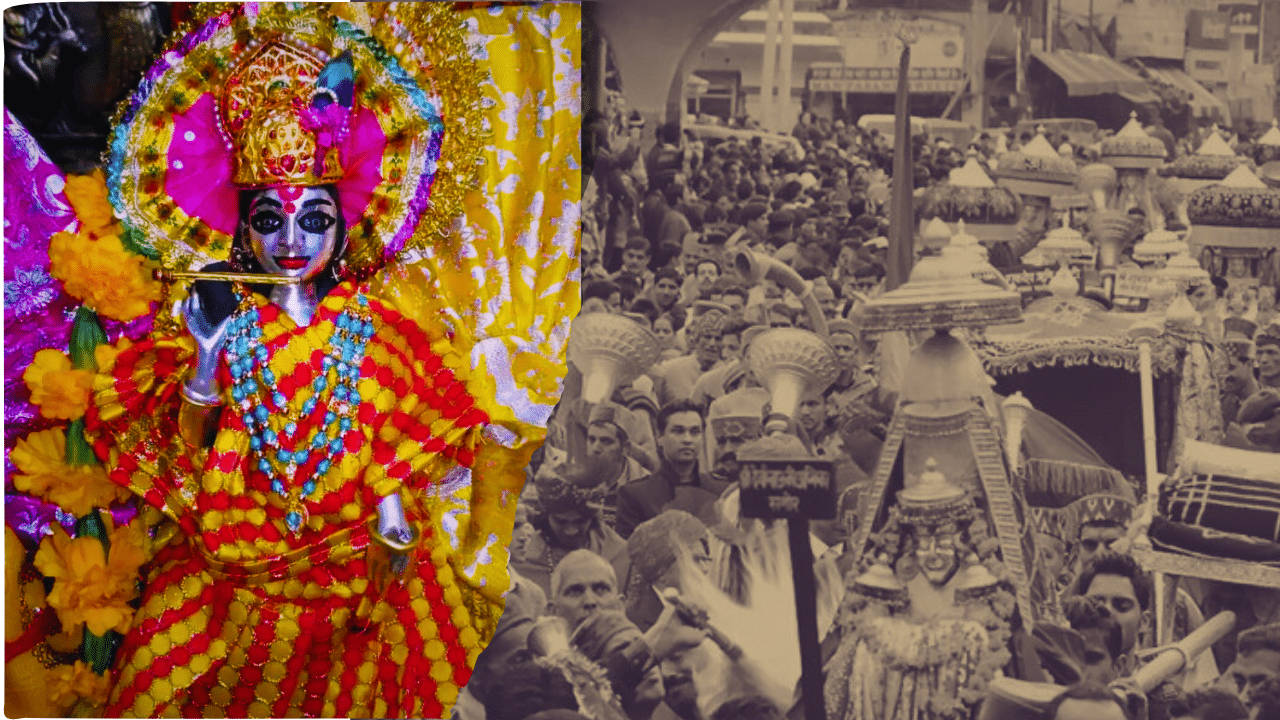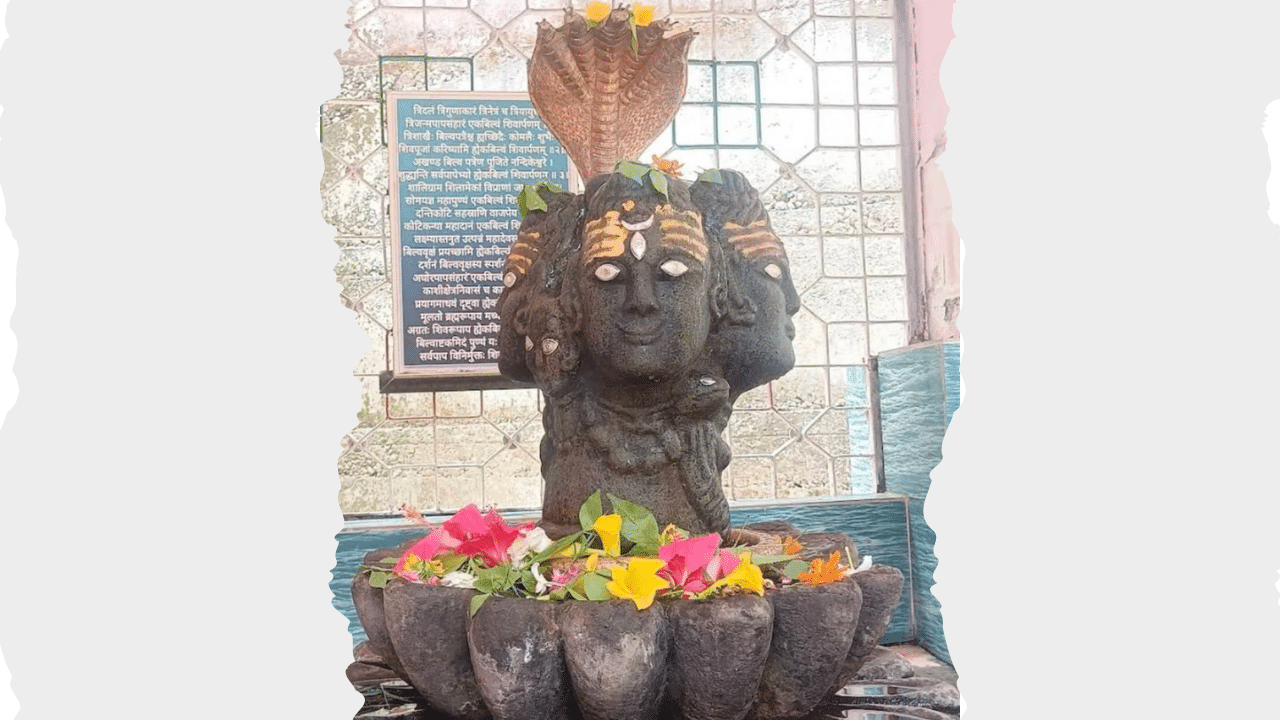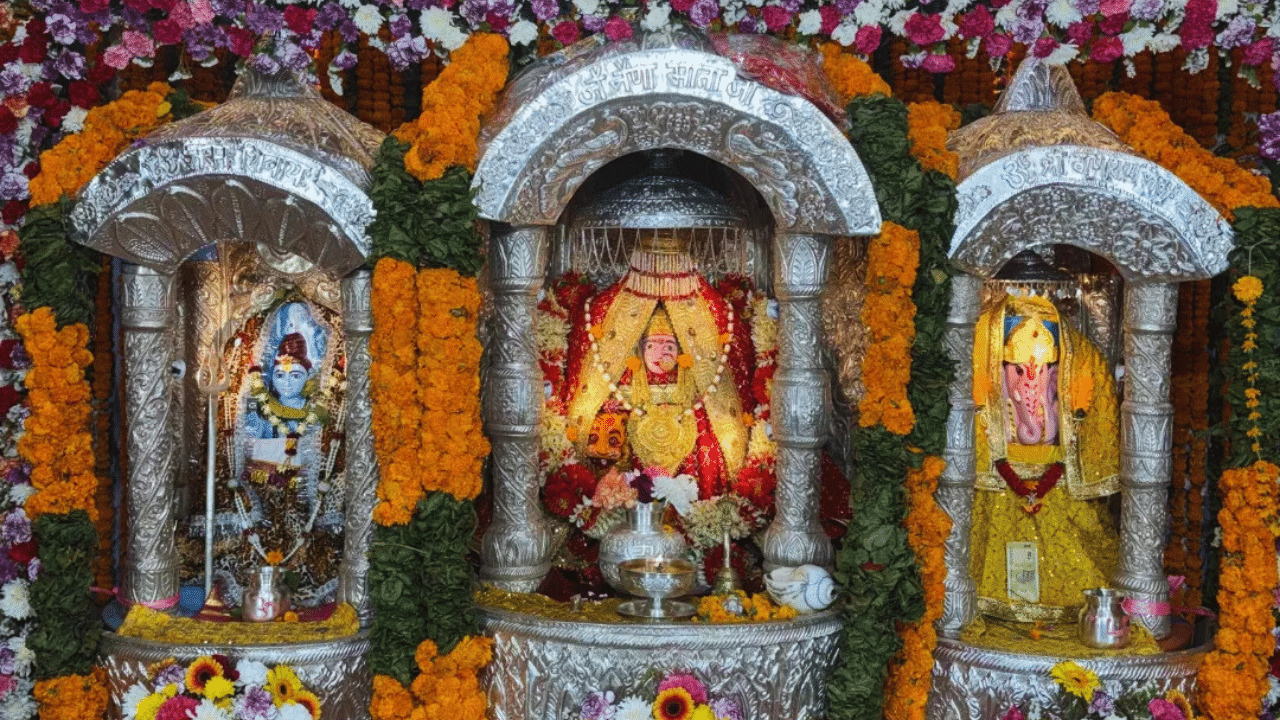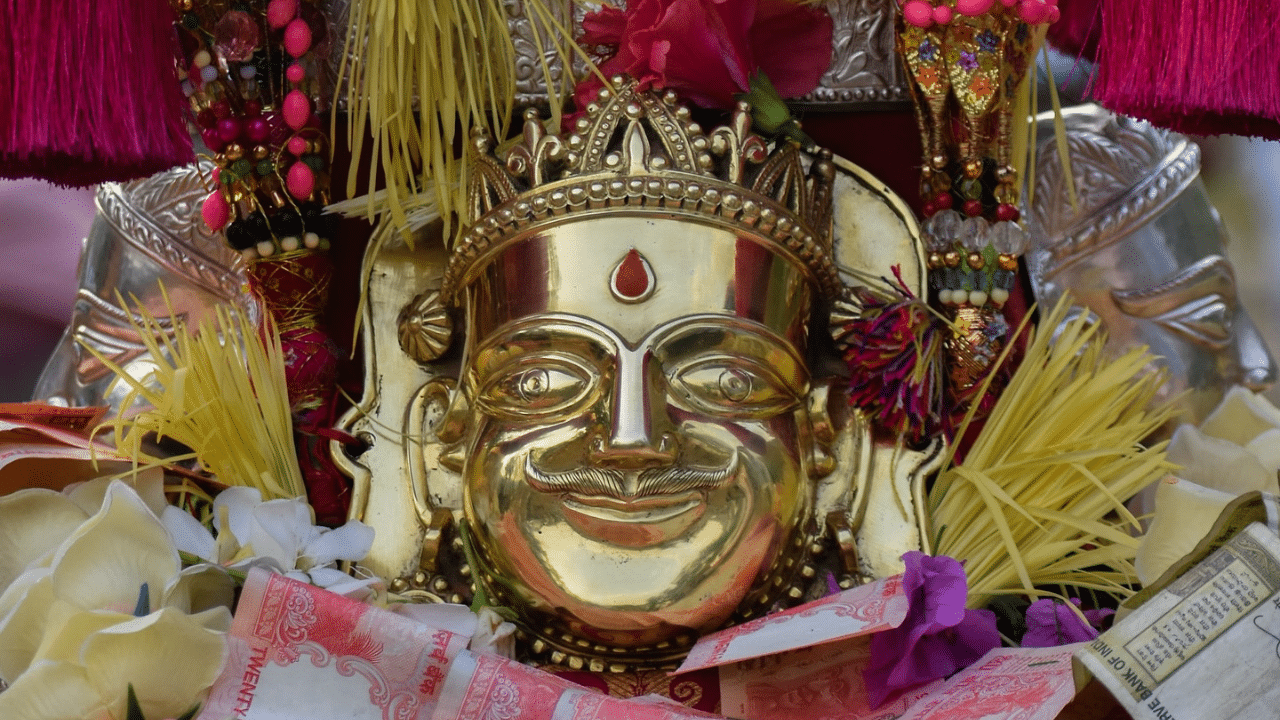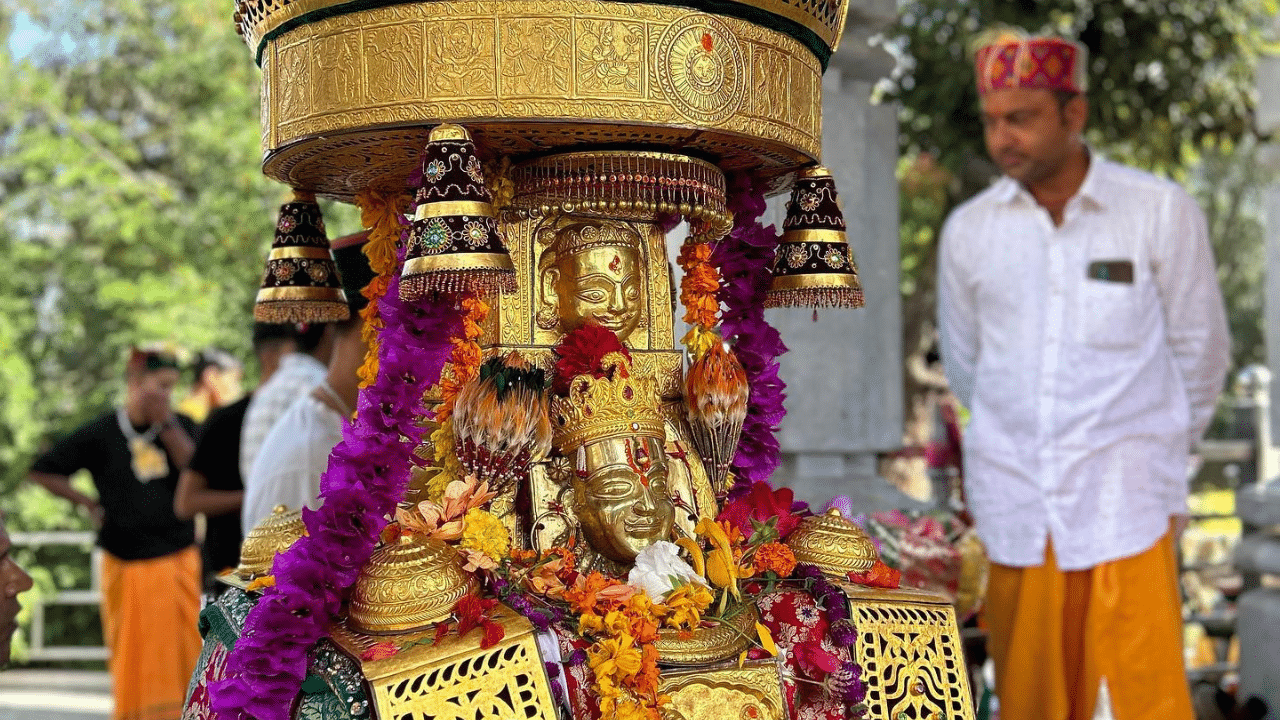Suraj Sen had 18 sons, all of whom died in his lifetime, and despairing of an heir he caused a silver image to be made which he named Madho Rao and to which he assigned the kingdom. It bears an inscription in Sanskrit of which the translation is as follows: “ Surya Sena, lord of the earth and destroyer of his rivals, had this blameless image of the blessed Discus-bearer, and master (guru) of all the gods, the illustrious Madho Rai, made by Bhima, the goldsmith, in the year 1705, on Thursday, the 15th Phagan.” This date corresponds to A.D. 1648.
Table of Contents
History of Madho Rai in Hindi
मंडी रियासत पर सेन वंश का आधिपत्य रहा है। माधोराय जिन्हें राज माधव के नाम से जाना जाता है। इन्हें राजदेवता का दर्जा प्राप्त है। इनका मंदिर दमदमा महल के साथ ही स्थित है। राजदेवता का दर्जा प्राप्त है। अंतर्राष्ट्रीय मंडी शिवरात्रि महोत्सव का प्रमुख आकर्षण राजदेवता माधोराय की जलेब रही है। राजतंत्र के जमाने से ही शाही अंदाज में निकलने वाली माधोराय की जलेब ग्रामीणों के साथ-साथ शहरवासियों के आकर्षण का केंद्र रही है।
मंडी शिवरात्रि मेलों के दौरान राजदेवता माधोराय की तीन जलेब निकालने की परंपरा रही है। राजतंत्र के जमाने से ही राजदेवता माधोराय की शाही जलेब निकलती है। जिसमें चुनिंदा देवी देवताओं के रथों के अलावा होमगार्ड और पुलिस बैंड, घुड़सवार और जवानों तथा स्कूली बच्चों की परेड भी शामिल होती रही है। माधोराय की इस राजसी ठाट से निकलने वाली जलेब में सनोर बदार, चौहार और सराज क्षेत्रों के कुछ चुनिंदा देवी-देवताओं को शामिल होने का गौरव प्राप्त है। हालांकि, मंडी शिवरात्रि के प्रमुख लोकदेवता बड़ादेव
कमरूनाग माधोराय की जलेब में शामिल नहीं होते हैं। बड़ादेव मेलों के दौरान टारना मंदिर में विराजमान रहते हैं। उनके दर्शनों के लिए श्रद्धालुओं की भीड़ उमड़ी रहती है। मंडी शिवरात्रि के दौरान राजतंत्र के जमाने में राजा हाथी पर सवार होकर जलेब में शामिल होता था। जिसमें शिवरात्रि की जलेब के कुछ चित्र मंडी की कुछ प्राचीन हवेलियों में देखने को मिलते हैं। इन चित्रों में सेरी चानणी और घंटाघर के आसपास लगे मेले के दृश्य चित्रित हैं। शिवरात्रि मेलों की शुरूआत इसी स्थान से हुई है। वहीं पर जलेब देखने उमड़ी भीड़ और रनिवास के झरोखों से रानियों और
राजपरिवार से जुड़ी महिलाओं के उत्सुकता से इस भव्य जलेब को देखने के दृश्य भी इन चित्रों में चित्रित हैं। वर्तमान में भी माधोराय की जलेब का वही शाही अंदाज कायम है। लेकिन उसका स्वरूप थोड़ा बदल गया है। अब राजाओं की जगह जनप्रतिनिधियों ने ले ली है। पहली जलेब में प्रदेश के मुख्यमंत्री अपने लावलश्कर के साथ शिरकत करते हैं तो अंतिम जलेब में प्रदेश राज्यपाल के शामिल होने की परंपरा है।
जबकि मेले की दूसरी जलेब में वरिष्ठ मंत्री शिरकत करते हैं। शिवरात्रि की जलेब के दौरान राजदेवता माधोराय की 1705 ई. में बनी चांदी की प्रतिमा को पालकी में बिठाया जाता है। और चांदी की कुर्सी को पड्डल मैदान तक ले जाया जाता है। जलेब में शामिल देवताओं के देवलु ढोल-नगाड़ों की ताल पर नाचते-गाते हुए चलते हैं।
History of Madho Rao
Surya Sen, lord of the earth, and destroyer of his rivals, had this blameless image of the blessed Discus-bearer, and master (guru) of all the gods, the illustrious Madho Rai, made by Bhima, the goldsmith, in the year 1705, on Thursday, the 15th Phagan”. This silver image is still the object of highest veneration by the Raja and his people, and on important occasion in the Raj family. it is worshipped with due ceremonies. At every important festival Madho Rao is taken out in a picturesque and yet sacred procession followed by the ruler; and all the people of Mandi pay it the respect and homage due to a protecting deity. It is Madho gives Raj tilak to every ruler of the Mandi state.
As noted in the account of Suraj Sen’s reign, the national deity of Mandi is now regarded as Médho Rao, a manifestation of Vishnu to whom the Raja consigned his kingdom. There can, however, be little doubt that the Vishnavi form of religion was neither the ancient nor the popular faith of the Mandi dynasty. The ancestral god or kulaj is the Devi; the worship of Shiva and his consort, except perhaps for a short period during Suraj Sen’s lifetime, has always been far more observed than that of the more gentle member of the Hindu Trinity.
Vishnuism, both here and in Kullu, appears to have come into temporary favour about the same time, and in both States was adopted as the State religion. But in Mandi, the adoption has been very partial, and, for the most part, consists of the formal recognition of Madho Rao as the nominal head of the State. This is now shown in several ways that are of interest to some.

The Janam Ashtami, or birthday of Krishna, is observed as a State celebration, the ceremonies taking place, either in a room adjoining the temple of Madho Rao or in the Damdama palace situated in the same building, immediately above the room where the god’s image is enshrined. A small swing is hung from the rafters, an image of Krishna placed on the seat and flowers and rich cloth spread over it.
At midnight the Raja holds a durbar in the presence of the image at which all the leading State officials attend. A salute of 11 guns, like for the Raja, is fired in honour of the god.
There is music and dancing and the Raja worships the god by throwing flowers on the image. A-distribution of pagris, all of which are yellow, then takes place. The image is first decked and then the Raja with his hand binds one on the head of the officiating priest who in turn twists one around Raja’s head. Others are given to the ahlkars present according to their rank, the gifts being regarded as a special mark of favour. For this reason, they are not given lavishly, for as the local proverb says: “The value of pagris given at the Janam Ashtami disappears if they are distributed in large numbers.”
Again in all religious ceremonies of a personal nature relating to the Raja, the worship of Madho Rao is an essential part. Only when his blessing has been invoked can they proceed and this is so, even when, as in the case of the haircutting ceremony, the main rites are performed in the presence of the family goddess. ‘The Raja takes a prominent part in the celebration of public worship, in particular on the four great festivals of the year—the Shivrdtri, the Holi, the Dussehra and the Dipmala. On each of these occasions, he goes in procession, accompanied by officials of the State, the army and band, and his personal- retainers.
On the Dussehra and the Holi, the image of Madho Rao is borne in the procession and immediately precedes the Chief. On the other two festivals, Madho Rao does not process if the Raja, his deputy, is himself present in the State to represent him; but if the Raja is absent he attends, and since the death of the late Raja has regularly taken part in the celebrations.
Of these, the most important is the Shivratri, when the village gods are carried into Mandi to do homage to Madho Rao and the Raja. The fair lasts for some days, but it is a general rule that each god on arrival shall pay his respects to Madho Rao before he proceeds to the palace to salam the ruler. On the second day of the fair, a parade of gods is held on the Pédal, the large open plain in the angle between the Beas and Suketi;
the various deities— which number in all about 100 – are arranged according to precedence in line, along which the Raja with his officials passes to receive their homage. Madho Rao, as already noted, does not attend except when the Raja cannot act for him; but his absence is attributable to the fact that the fair is held on the great festival in honour of Shiva, a circumstance which supports the conclusion that the adoption of Vishnuism as the State religion is of comparatively recent date.
The gods, however, now admit the nominal suzerainty of Madho Rao, and the Raja both as his vice-regent and as temporal ruler exercises over them very definite jurisdiction. They are subject to his orders and must attend to him when summoned. A new festival cannot be instituted without his permission, nor a god, who has previously been without a rath or litter, be given one without special sanction. A few years ago, the subjects of a village deity wished to change the shape of his idol, from the pyramidal form popular in some parts of the State to the form with the large circular canopy favoured by his immediate neighbours;
but before they could do so the Raja’s approval had to be obtained. Ordinarily, the Raja does not interfere in the appointment of the god’s diviner, but his right to do so is recognised, and for the more important gods it is exercised. This is especially the case where the office of diviner is hereditary in several families and changes are accordingly numerous. Each change of office has to be reported for his sanction. Similarly, where the office is hereditary and the family becomes extinct, Raja’s orders must be obtained regarding the selection of a household from which future candidates are to be taken.
Final Words
Source: Gazetteer of the Mandi State
